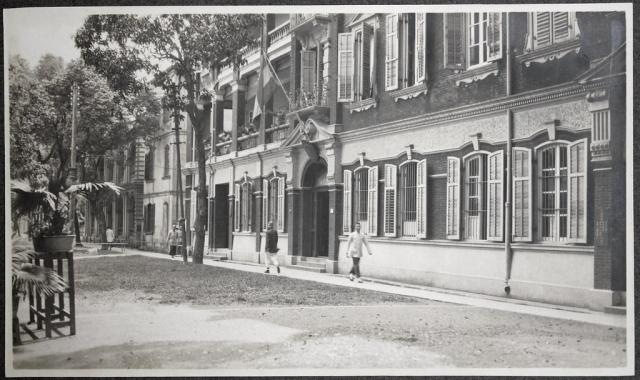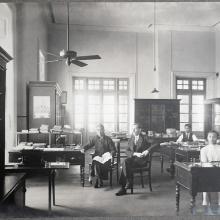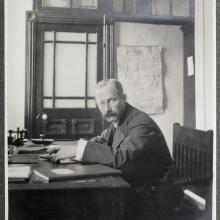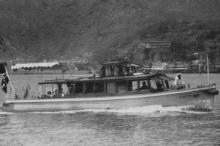Charles Gesner van der Voort had started his career in Rotterdam, at Holland-China Trading Company (HCHC). In 1938, he went to Shanghai for the firm. The Japanese interned him, and most other Dutch nationals, from 1943-45. In camp, he met his wife Nancy and they married after the war. After a leave in The Netherlands, they returned to the Orient, where Charles continued to work for HCHC in Hong Kong.
Twenty years before Charles started, in 1918, a photo album was made of the Hong Kong office and office staff. This photo shows the Guangzhou office, Canton at the time.
The office also served as the Dutch consulate in Guangzou, judging by the flag and plate above the front entrance.
Frits Kien (1904-1987), was related to HCHC-director Willem Kien. He was experienced when Charles arrived in 1939, and taught him the trade. With a very kind gesture, I was offered his autobiography, to lend as a source for my book "Charles in Shanghai". During his stay in Guangzhou (Canton) for HCHC in 1937, he served in such a Dutch court.
“In Canton we also had extra-territorial rights, we did not have to appear in front of a Chinese judge. Instead one had to appear at one own country’s consulate. When I was stationed in Canton, the Consul-general in Hong Kong had arranged with the Dutch embassy in Nanking, that I would join Dutch court in Canton. The consul for the Netherlands in Canton, an elected consul, who worked for Java-China-Japan Line, was also member of Dutch court. This gentleman had a law book in his possession. During my stay in Canton, we had twee court cases. A: a protest against unpaid drafts and B: a Dutch firm had fired its assignee and he did not want to return the proxy. The consul and I would be going through the law books at night to see whether we had a court case. If we found the right articles, they had to be translated into English. Then the party involved had to be summoned and the summons had to be signed by the person who was summoned. The Consul-general in Hong Kong took care of sending it through to the consulate in Nanking. Half a year later, we received our fee, calculated in dimes per syllable.”
Card boards, used in Dutch court in Shanghai, in Chinese, English and Dutch, used by people to appear in court, can be found here:
<a href="https://old.gwulo.com/%3Ca%20href%3D"https://www.flickr.com/photos/161392673">https://www.flickr.com/photos/161392673@N02/46972383041/">www.flickr.com/photos/161392673@N02/46972383041/</a>
1256 N.V. Internationale Crediet- en Handelsvereniging Rotterdam/C.V. en N.V. Wm H. Muller & Co. (Internatio-Muller N.V.) 1402 Foto album van kantoren in China.
courtesy Stadsarchief Rotterdam, <a href="https://old.gwulo.com/%3Ca%20href%3D"http://www.stadsarchief.rotterdam.nl/en">http://www.stadsarchief.rotterdam.nl/en" rel="noreferrer nofollow">www.stadsarchief.rotterdam.nl/en</a> (photo)
Courtesy De Jongh family archives, Anneke Knüppe-de Jongh (Frits Kien diary)




